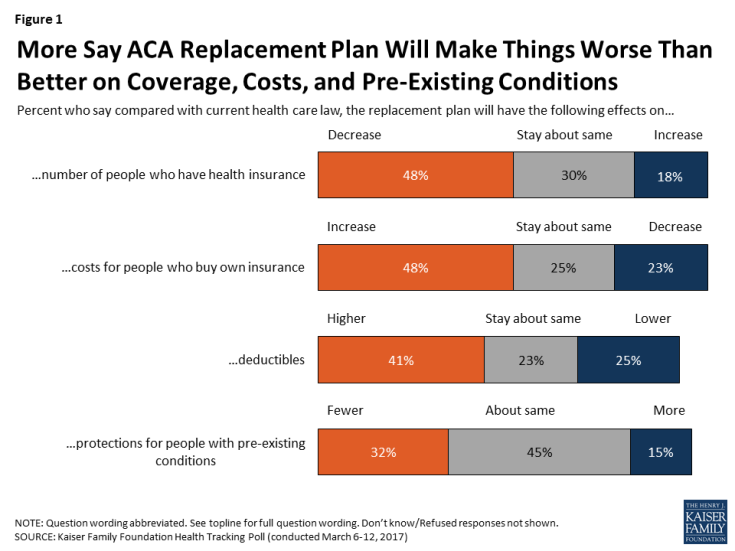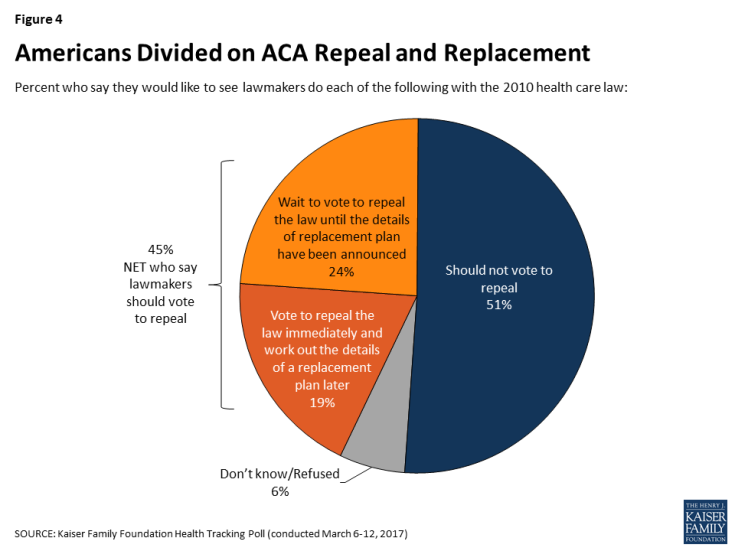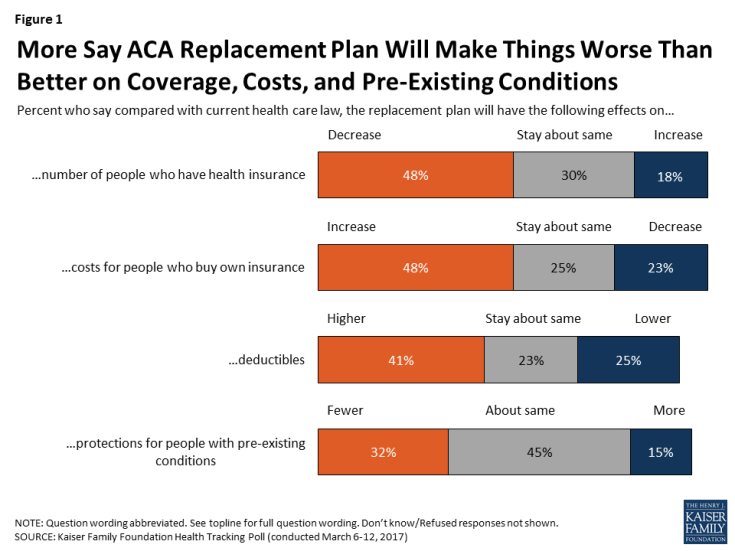
Most Americans do not believe that TrumpCare, the GOP plan to replace the Affordable Care Act (the ACA, aka ObamaCare), will make things better for U.S. health citizens when it comes to peoples’ health insurance coverage, the premium costs charged for those health plans, and protections for people with pre-existing medical conditions.
The March 2017 Kaiser Family Foundation Health Tracking Poll examined U.S. adults’ initial perceptions of AHCA, the American Health Care Act, which is the GOP’s replacement plan for the ACA.
There are deep partisan differences in perceptions about TrumpCare, with more Republicans favorable to the plan — although not with majority margins. Only “providing about the same protections for people with pre-existing conditions” receives a majority of Republican support at 63%, compared with 32% of Democrats and 47% of Independents (with an overall “score” of 45% of all U.S. adults believing this).
46% of Republicans believe that TrumpCare would decrease costs for people who buy their own insurance, compared with 6% of Democrats and 25% of Independents (with an overall 23% of U.S. adults supporting this notion).
 There is a slight majority tilt to favoring the ACA, with 51% of people saying to vote not to repeal. The partisan divide is clear on repeal, with 81% of Republicans supporting immediate repeal, and 78% of Democrats supporting no repeal. Note that Republicans are evenly divided between those who want Congress to wait to vote on repeal until details of a replacement are finalized (41% of Republicans), compared with 36% of Republicans who support immediate repeal without a replacement.
There is a slight majority tilt to favoring the ACA, with 51% of people saying to vote not to repeal. The partisan divide is clear on repeal, with 81% of Republicans supporting immediate repeal, and 78% of Democrats supporting no repeal. Note that Republicans are evenly divided between those who want Congress to wait to vote on repeal until details of a replacement are finalized (41% of Republicans), compared with 36% of Republicans who support immediate repeal without a replacement.
This poll also analyzed voters’ views on women’s health – with a deep dive into perspectives on Planned Parenthood funding and demand.
75% of U.S. adults say Federal Medicaid payments to Planned Parenthood should continue, including:
- 87% of male Democrats
- 90% of female Democrats
- 55% of male Republicans
- 57% of female Republicans
- 72% of male Independents, and
- 74% of female Independents.
Most people are aware of the range of services provided by Planned Parenthood:
- 87% of U.S. adults know about contraception services, such as birth control
- 80% are aware of testing and treatment for sexually transmitted diseases (STDs)
- 68% know about cancer screenings and preventive services (such as mammograms and pap smears)
- 68% are aware of abortion availability.
Only one-third of people are aware of the Federal ban for using Medicaid funds to pay for abortions (33%), with fewer Republicans aware of that ban (25%).
Finally, a majority of U.S. adults support keeping in place the Affordable Care Act’s provisions for women’s and children’s health care, more heavily weighted toward women supporting this support than men — in particular, only 3 in 10 Republican men (31%) say it is very important for private health plans to cover the full cost of birth control if the ACA is repealed.
The Kaiser Family Foundation surveyed 1,206 U.S. adults 18 and older between March 6-12, 2017, via landline and cell phone.
Health Populi’s Hot Points: In a recent speech to employees, the CEO of U.S. News & World Report’s #1 “best hospital,” the Mayo Clinic, said, “We’re asking … if the patient has commercial insurance, or they’re Medicaid or Medicare patients and they’re equal, that we prioritize the commercial insured patients enough so … we can be financially strong at the end of the year to continue to advance, advance our mission.” This story was published by The Minneapolis Star Tribune yesterday (March 15, 2017) and the newspaper obtained a transcript of the speech to confirm its authenticity.
What Mayo CEO Dr. John Noseworthy is publicly, transparently explaining is that the hospital profit margins are at stake. If the Mayo admissions clerk is faced with admitting an inpatient enrolled in, say, employer-sponsored health plan with a commercial insurance company, versus a sick person enrolled in Medicaid or Medicare, and one bed is available, then the commercially-insured patient will gain admission. With the swipe of the patient’s insurance identity card, the clerk or case manager’s computer system can immediately ascertain the patient’s payor and insurance details.
In this scenario, what would happen to an uninsured patient? In this letter written on 7 March 2017, the American Hospital Association has expressed concerns about the AHCA/TrumpCare, anticipating the current version of the law would result in Medicaid cuts leaving more patients uninsured as in pre-ACA days. Joining the AHA in protesting TrumpCare were the Federation of American Hospitals, the AARP, the American Nurses Association (tweeting the hashtag #ProtectOurCare), and the American Medical Association (physicians).
You don’t have to believe the Congressional Budget Office’s estimate of millions of people at-risk of losing health insurance. Check out the for-profit, commercial company Standard & Poor’s calculations: S&P concluded that TrumpCare would cost 6 to 10 million people their health insurance out of 22 million who gained coverage through Obamacare.
S&P writes, “S&P Global Ratings believes operating revenues and margins for for-profit and not-for-profit hospitals are likely to be pressured by the passage of the legislation as proposed. The overall payor mix for providers would weaken as the number of people without insurance would most likely rise as would the hospital sector’s level of bad debt and charity care expenses. Under the proposed bill, minimum insurance requirements will be diluted, and coupled with the elimination of the mandate to buy coverage, we believe preventive care may decrease leading to higher costs over the longer term. In addition the further growth in high-deductible plans that is likely, combined with greater levels of uninsured people, could result in higher health care costs to consumers.”
I added the bold italics in this paragraph to come full circle with Mayo CEO Noseworthy’s transparent statement: as long as hospitals in America are operating as the businesses they’re currently designed to be, Mayo Clinic’s approach to prioritizing commercially-insured patients is a rational response to the realpolitik of pragmatic U.S. healthcare. Indeed, rational; as for the larger concept of the ideal of American health citizenship, we’re overdue for a national conversation.
Postscript Sunday 19 March 2017: The Mayo Clinic published this press release on 17 March to “clarify” what CEO Noseworthy meant by his remarks. “Patient medical need will always be the primary factor in determining and seating an appointment,” the first sentence reads.





 Thanks to Feedspot for naming this blog, Health Populi, as a
Thanks to Feedspot for naming this blog, Health Populi, as a